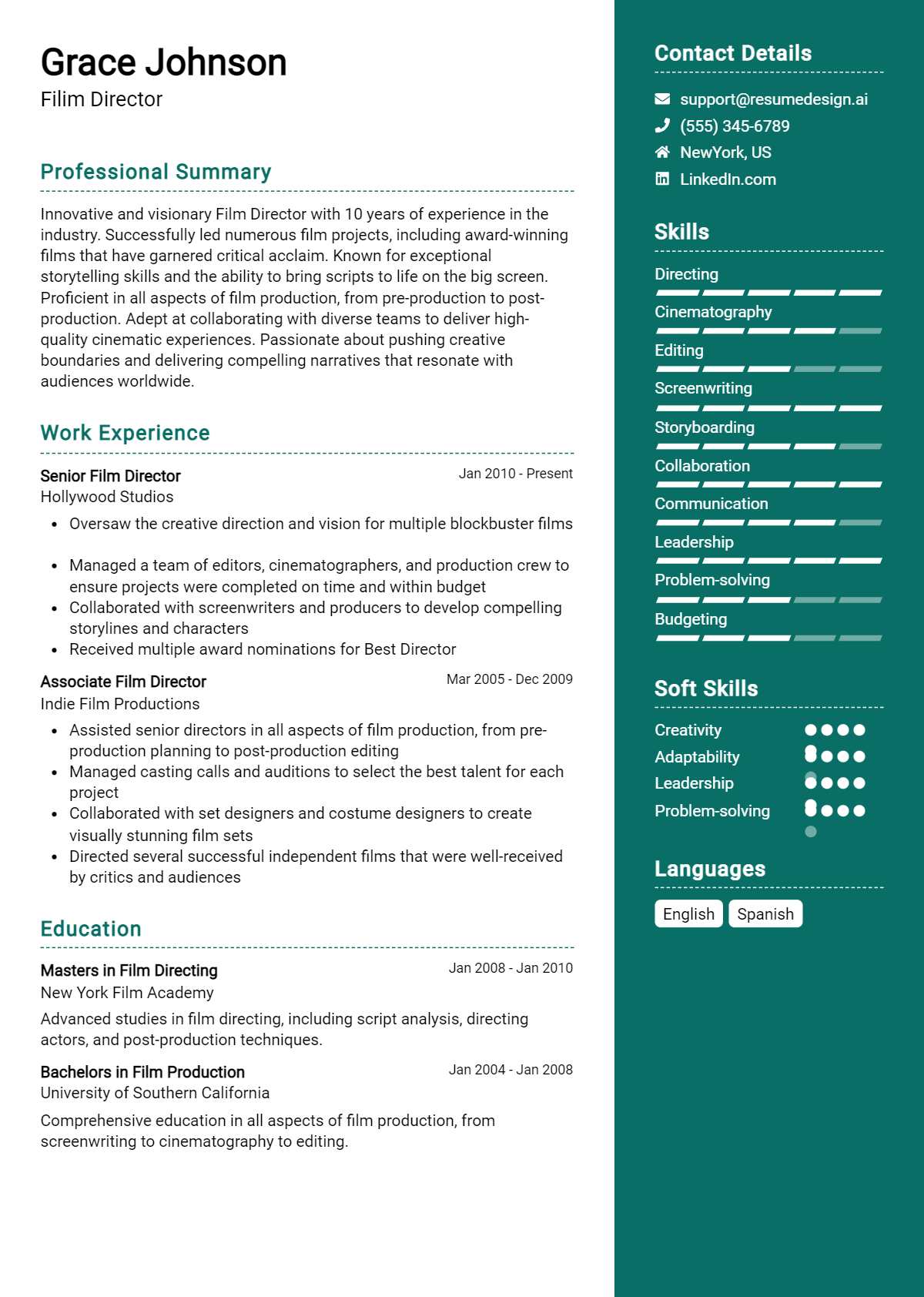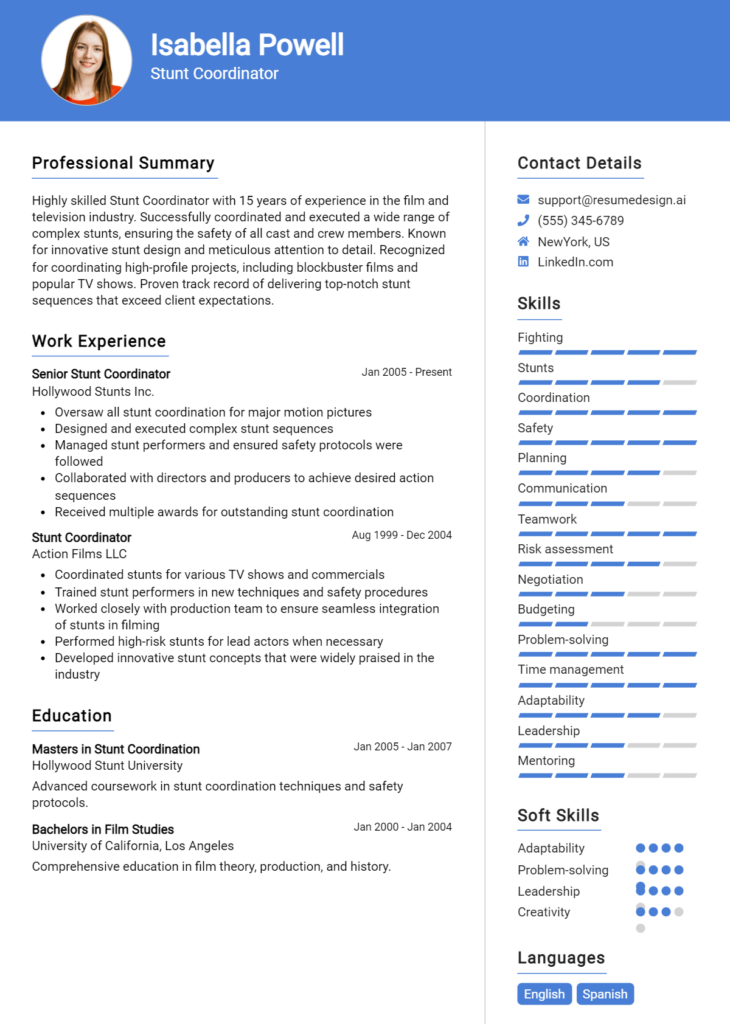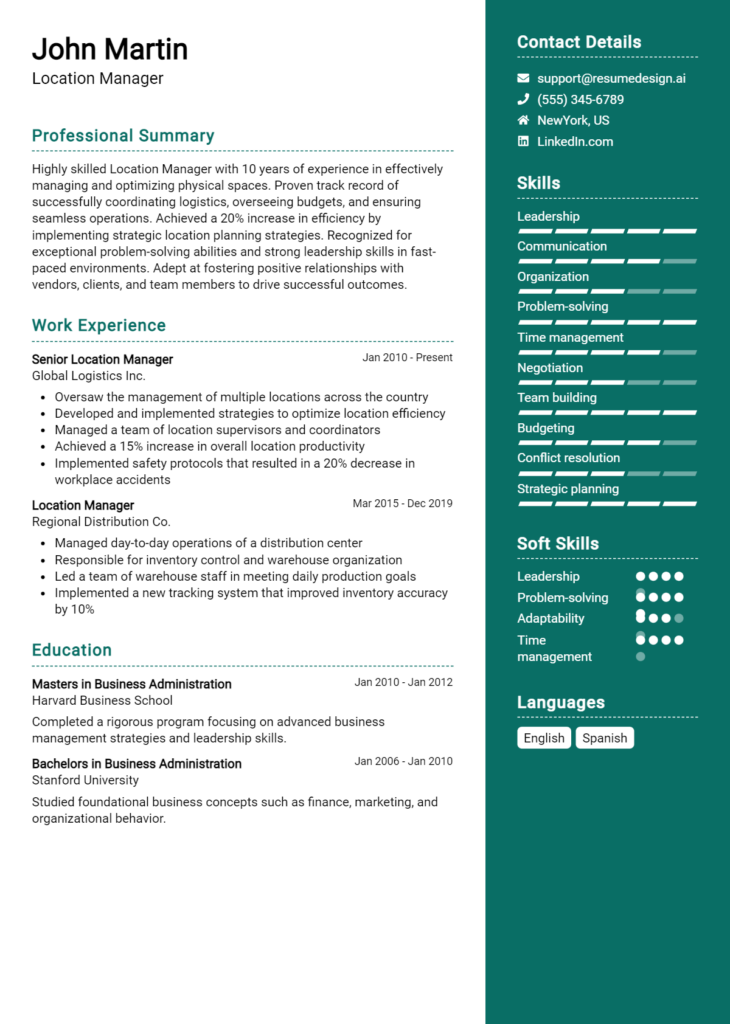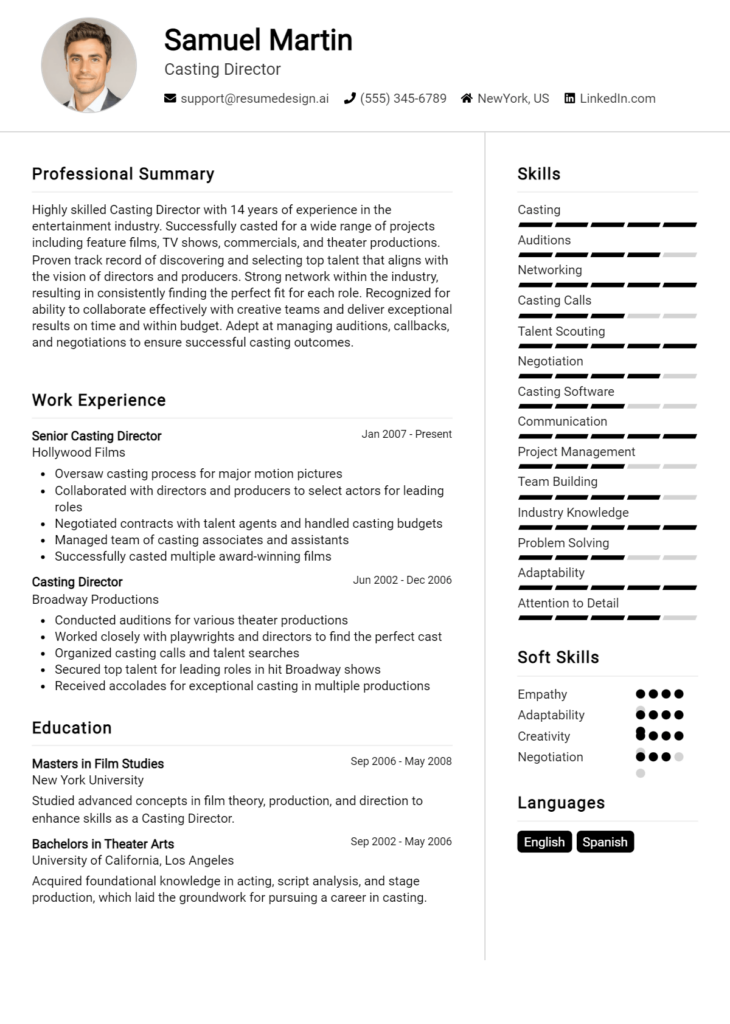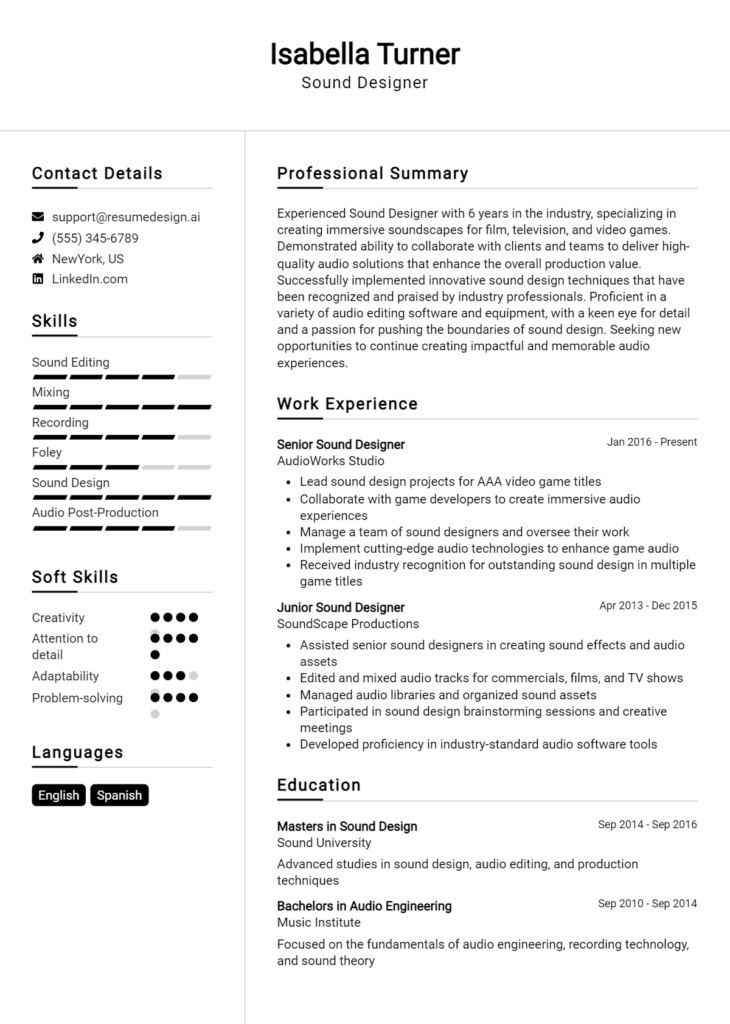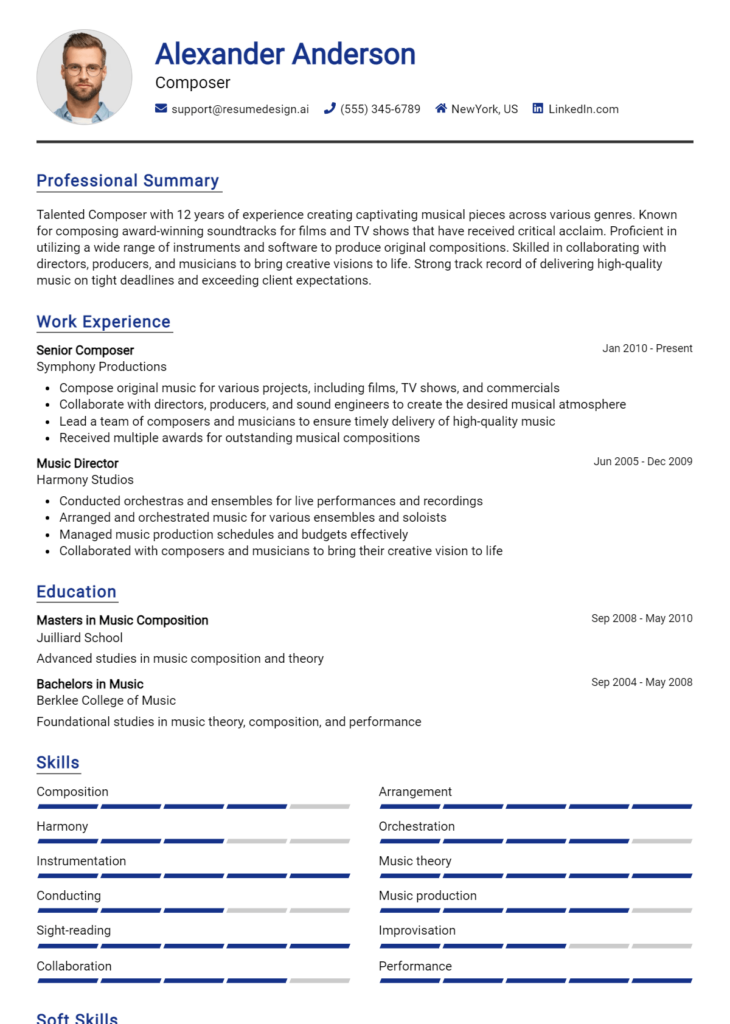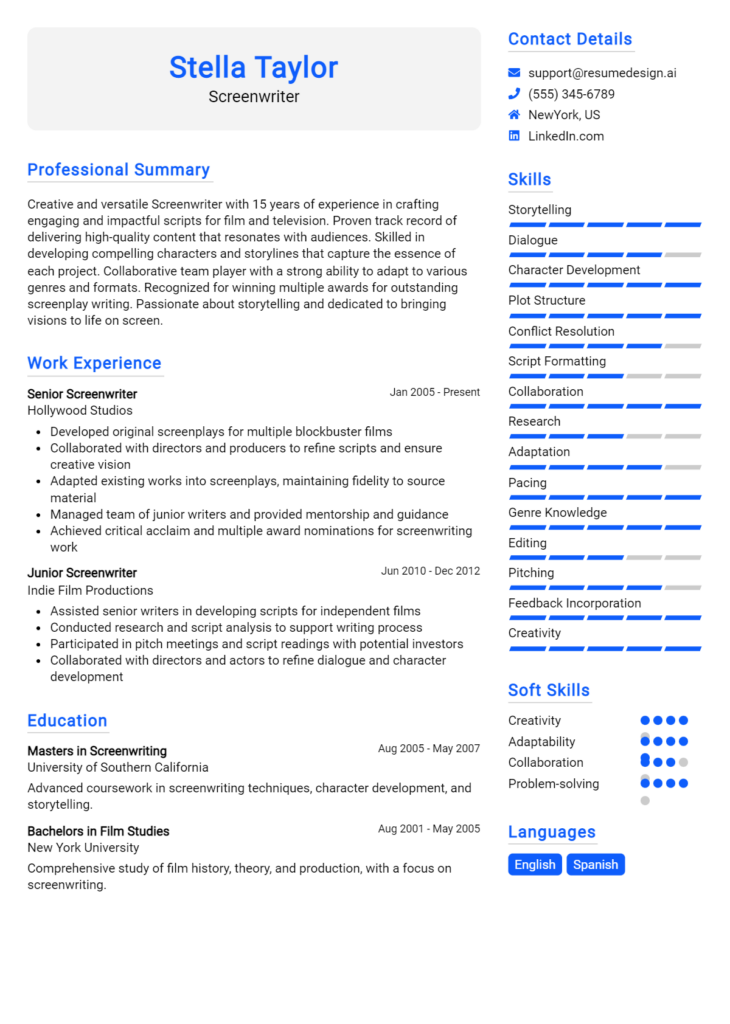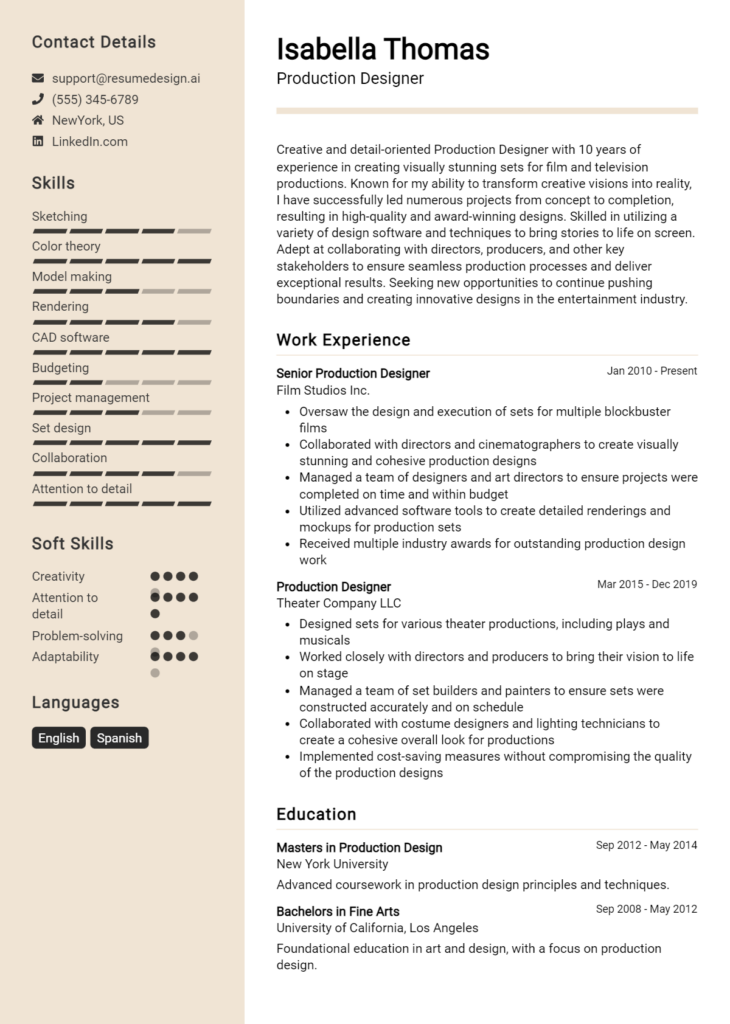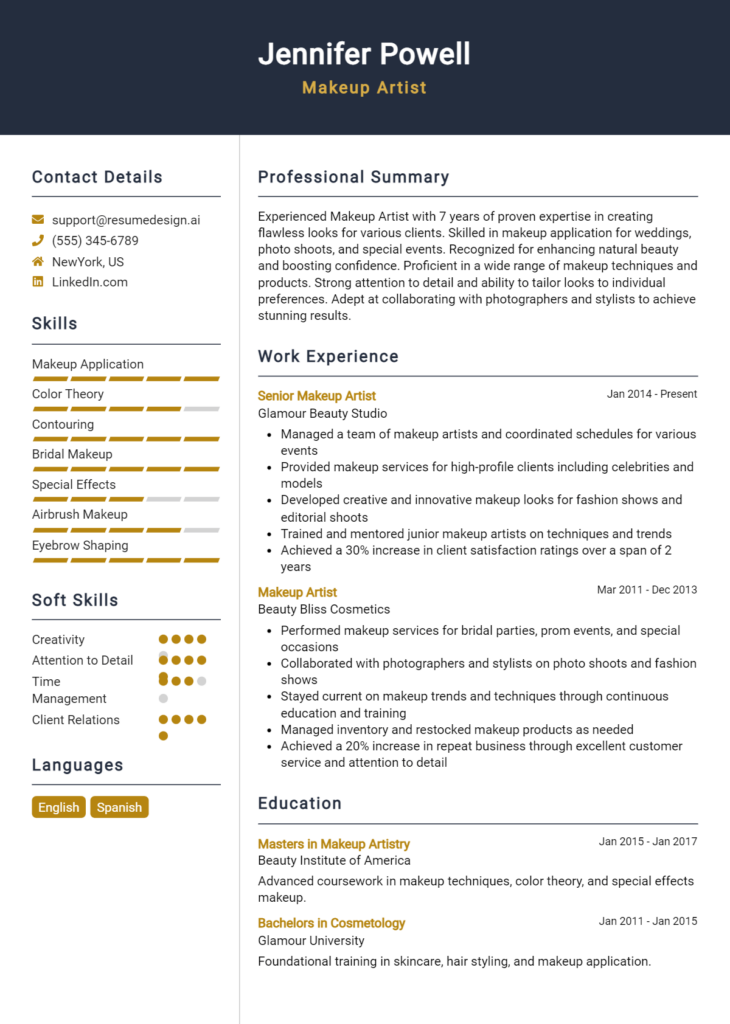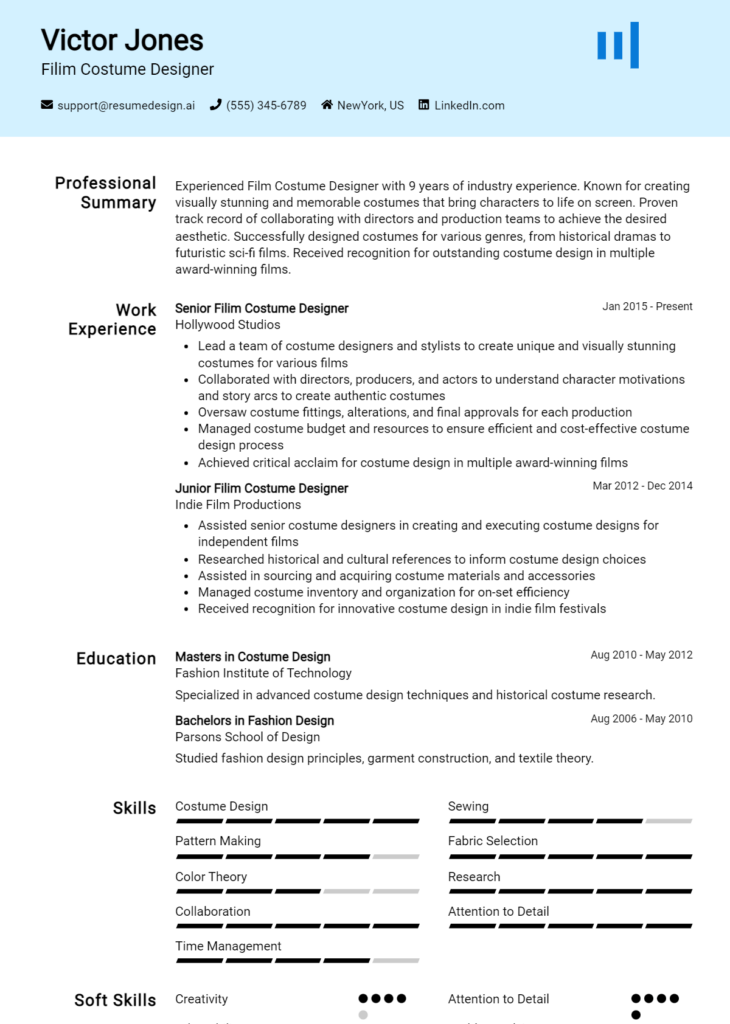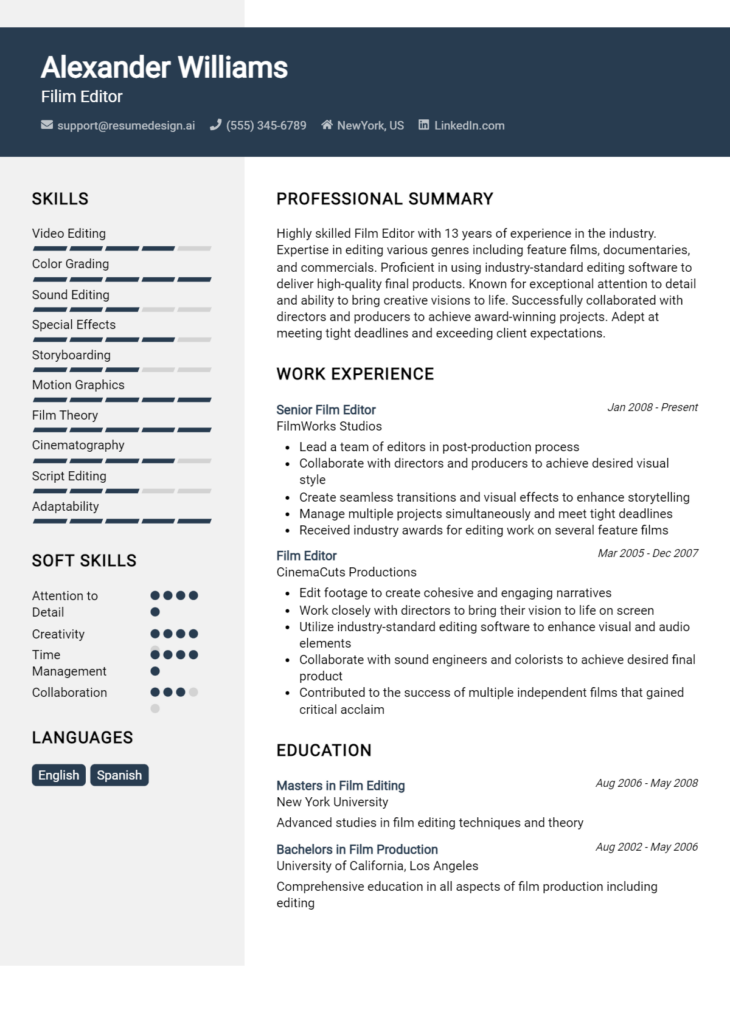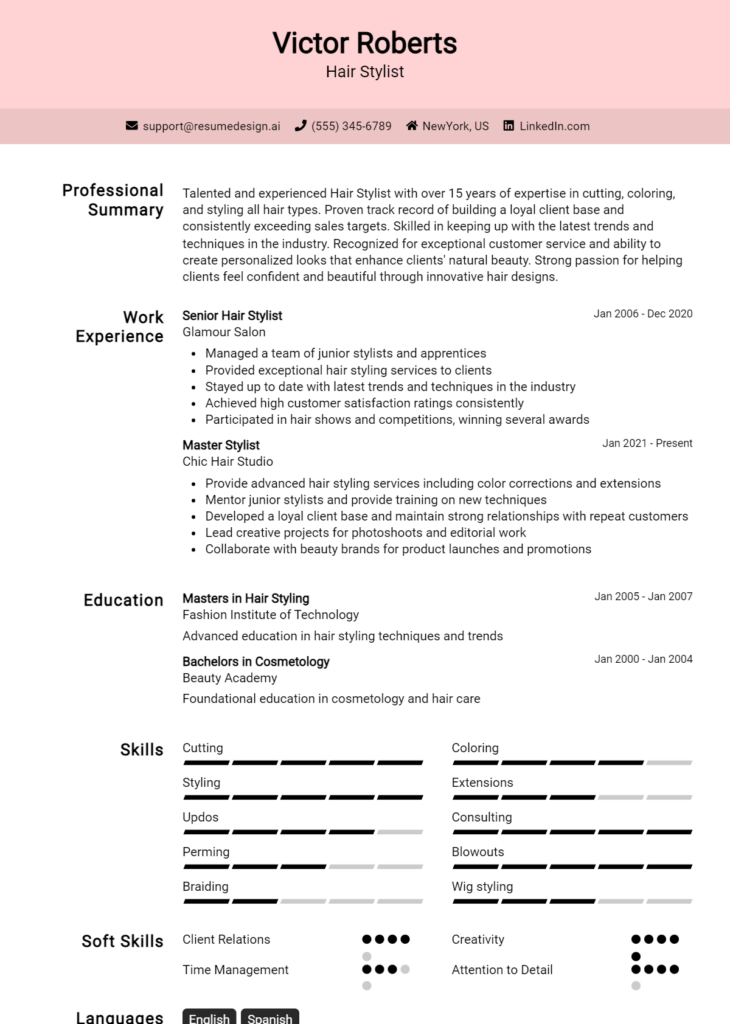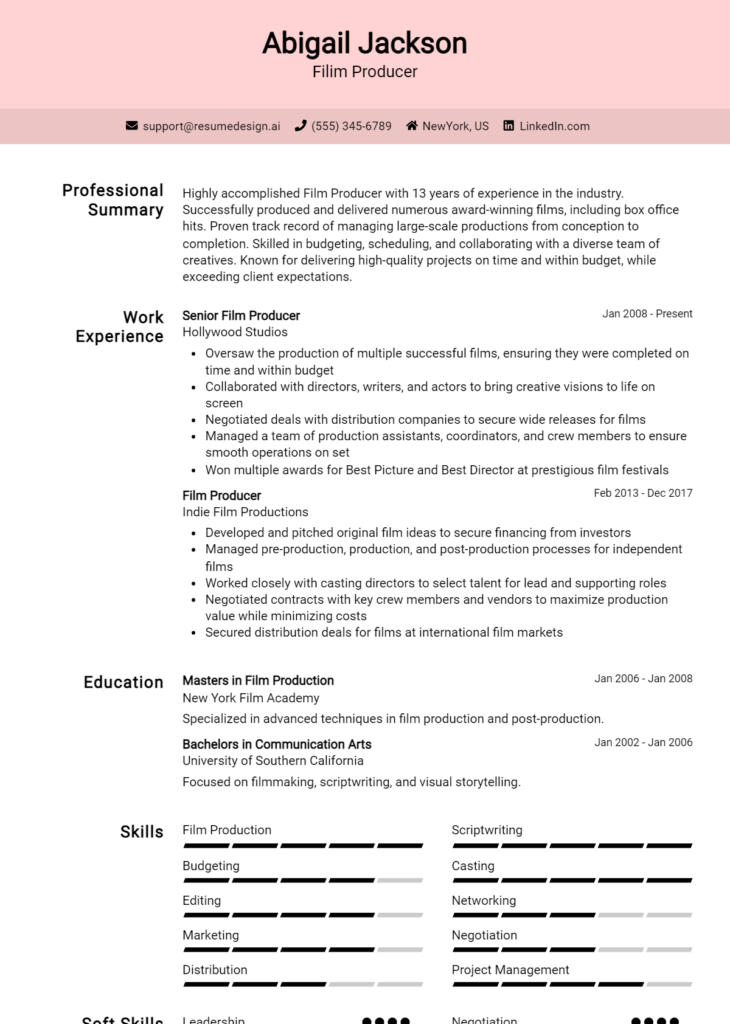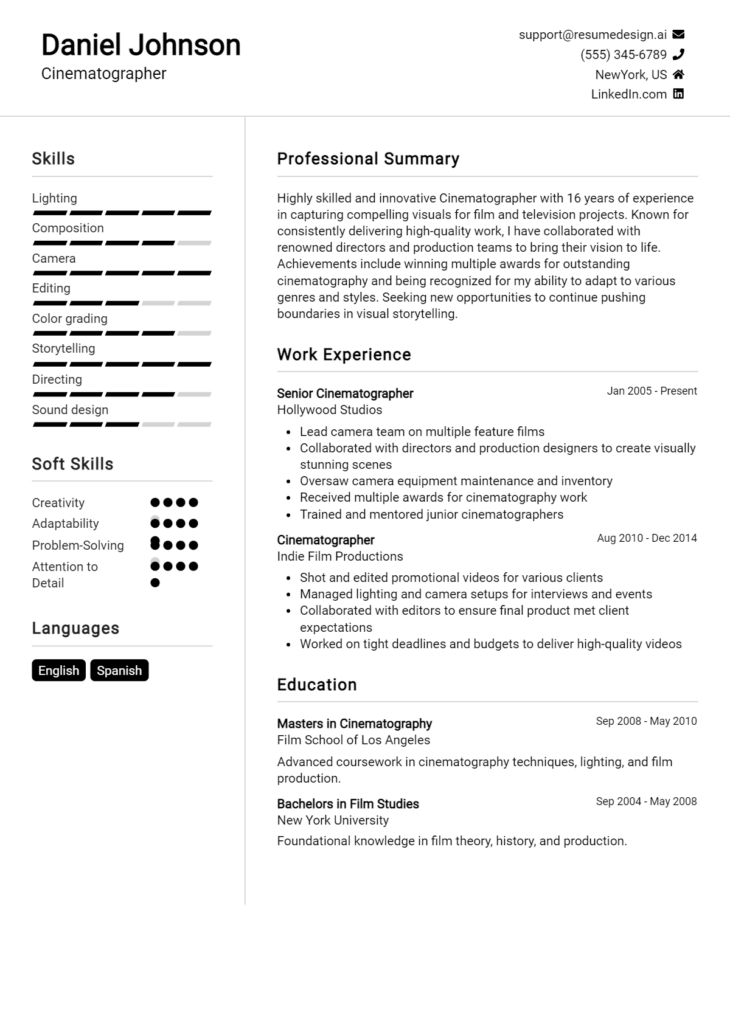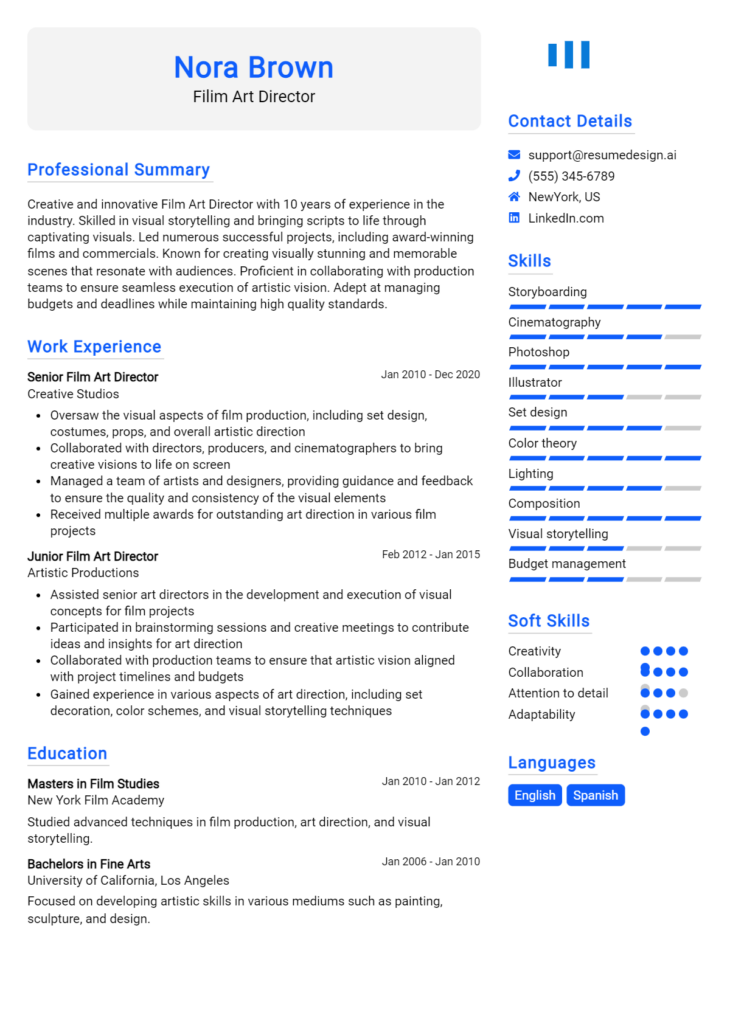Filim Director Core Responsibilities
A Film Director plays a pivotal role in bridging various departments, coordinating the artistic vision with technical execution. Key responsibilities include overseeing script development, guiding actors' performances, and collaborating closely with cinematographers, editors, and production designers. Essential skills encompass strong leadership, creativity, and problem-solving abilities, enabling the director to navigate the complexities of film production. A well-structured resume that highlights these qualifications is crucial for showcasing the director's capability to contribute effectively to the organization’s overarching goals.
Common Responsibilities Listed on Film Director Resume
- Developing and interpreting scripts to create a cohesive vision.
- Collaborating with writers, producers, and other stakeholders.
- Directing actors during rehearsals and performances.
- Managing the film budget and production schedule.
- Overseeing the technical aspects of film production.
- Conducting auditions and selecting cast members.
- Coordinating with the cinematography team for visual storytelling.
- Editing and refining the final cut of the film.
- Ensuring compliance with legal and safety regulations.
- Attending film festivals and promoting the finished product.
- Continuously evaluating and improving production processes.
- Building and maintaining relationships within the industry.
High-Level Resume Tips for Filim Director Professionals
A well-crafted resume is essential for Film Director professionals, as it serves as the first impression candidates make on potential employers in an industry that thrives on creativity and storytelling. Your resume must not only reflect your unique skills and artistic vision but also showcase your achievements and experience in a compelling way. In a competitive field where numerous talents vie for limited opportunities, a standout resume can be the key to unlocking your next big project. This guide will provide practical and actionable resume tips specifically tailored for Film Director professionals, helping you to present your most impressive self to potential collaborators and studios.
Top Resume Tips for Filim Director Professionals
- Tailor your resume to the specific job description by incorporating relevant keywords and phrases.
- Highlight your most significant directing experiences, focusing on projects that align with the type of work you want to pursue.
- Quantify your achievements when possible, such as mentioning awards won, box office numbers, or viewer ratings.
- Showcase your industry-specific skills, including expertise in various film genres, technical knowledge, and leadership abilities.
- Include a professional summary at the top that encapsulates your vision, style, and key accomplishments.
- Utilize a clean and visually appealing design that reflects your creative sensibility while remaining professional.
- Incorporate links to your portfolio, demo reels, or notable projects to provide tangible evidence of your work.
- Highlight collaborations with other professionals in the industry, emphasizing teamwork and your role in successful projects.
- Keep your resume concise, ideally one to two pages, focusing on the most relevant information.
- Regularly update your resume to include your latest projects and any new skills or qualifications you acquire.
By implementing these tips, you can significantly enhance your chances of landing a job in the Film Director field. A targeted and polished resume will not only demonstrate your qualifications but also convey your passion for storytelling and your ability to bring projects to life, making you a compelling choice for potential employers.
Why Resume Headlines & Titles are Important for Filim Director
In the competitive field of film direction, a standout resume can be the difference between landing an interview and being overlooked. Resume headlines and titles play a crucial role in this process by immediately capturing the attention of hiring managers and summarizing a candidate's key qualifications in a single impactful phrase. A strong headline should be concise, relevant, and directly tied to the specific job being applied for, setting the tone for the rest of the resume and making a memorable first impression.
Best Practices for Crafting Resume Headlines for Film Director
- Keep it concise: Aim for a headline that is brief yet informative, ideally no longer than one sentence.
- Be role-specific: Tailor your headline to reflect the specific position you are applying for, using relevant terminology.
- Highlight key strengths: Focus on your most impressive skills, experiences, or accomplishments that set you apart from other candidates.
- Use action-oriented language: Incorporate strong verbs that convey your proactive approach and leadership abilities.
- Avoid clichés: Steer clear of overused phrases that do not add value or specificity to your headline.
- Showcase your unique style: If applicable, infuse your personal filmmaking style or vision into the headline to make it more memorable.
- Match industry standards: Use industry-specific terms that resonate with hiring managers in the film industry.
- Consider your target audience: Think about the preferences of hiring managers and tailor your headline to appeal to them.
Example Resume Headlines for Film Director
Strong Resume Headlines
Award-Winning Film Director Specializing in Narrative Storytelling and Visual Aesthetics
Innovative Filmmaker with 10+ Years of Experience in Independent Cinema and Documentary Production
Creative Visionary Committed to Crafting Compelling Cinematic Experiences that Resonate with Audiences
Weak Resume Headlines
Film Director Looking for Work
Experienced Professional in the Film Industry
Strong headlines are effective because they clearly communicate the candidate’s unique skills and experiences while immediately capturing the attention of hiring managers. They convey specific achievements and expertise that set the candidate apart in a crowded field. Conversely, weak headlines fail to impress due to their vagueness and lack of specificity, making it difficult for hiring managers to understand the candidate's unique qualifications or motivations. A well-crafted headline can make all the difference in standing out and making a positive impression in the film industry.
Writing an Exceptional Filim Director Resume Summary
A resume summary is a crucial component for a Film Director, as it serves as the first impression for hiring managers who sift through numerous applications. A well-crafted summary quickly captures attention by succinctly showcasing key skills, relevant experience, and notable accomplishments that align with the job role. It should encapsulate the essence of the candidate’s career, making it impactful and tailored specifically for the position they are applying for. A strong resume summary not only highlights the director's creative vision and leadership abilities but also demonstrates their capacity to deliver successful film projects.
Best Practices for Writing a Filim Director Resume Summary
- Quantify achievements: Use specific numbers to highlight the success of past projects, such as box office revenue or awards won.
- Focus on skills: Emphasize relevant skills like storytelling, team leadership, and technical expertise in cinematography and editing.
- Tailor the summary: Customize the summary to align with the specific job description and the company’s vision.
- Be concise: Keep the summary brief, ideally within 3-5 sentences, to maintain the reader's attention.
- Highlight versatility: Mention experience across various genres or formats, showcasing adaptability in the film industry.
- Use action verbs: Start sentences with dynamic verbs to convey a sense of energy and initiative.
- Include notable collaborations: Reference partnerships with well-known actors, producers, or studios to lend credibility.
- Showcase awards and recognition: Mention any accolades or nominations to underline professional success.
Example Filim Director Resume Summaries
Strong Resume Summaries
Dynamic Film Director with over 10 years of experience in the industry, successfully leading projects that grossed over $50 million in box office sales. Recognized for innovative storytelling and collaboration with A-list talent, earning two Academy Award nominations for Best Director.
Creative visionary with a proven track record of directing award-winning documentaries and feature films. Skilled in all facets of production, from script development to post-production, with a focus on delivering compelling narratives that resonate with audiences, resulting in a 30% increase in viewer engagement.
Accomplished Film Director specializing in action and drama, with 5 films released to critical acclaim, including a Golden Globe winner. Adept at managing large production teams and budgets, consistently meeting deadlines and enhancing project efficiency by 25%.
Weak Resume Summaries
Experienced Film Director looking for new opportunities in the industry. I have worked on various projects and have a passion for filmmaking.
Film Director with some experience in making movies. I enjoy working with actors and crew to create films.
The strong resume summaries are effective because they provide specific details about achievements, quantify results, and highlight relevant skills, making them directly relevant to the role of a Film Director. In contrast, the weak summaries are vague and generic, lacking any measurable outcomes or unique selling points, which makes them less compelling to potential employers.
Education and Certifications Section for Filim Director Resume
The education and certifications section of a Film Director resume plays a crucial role in establishing a candidate's qualifications and expertise in the film industry. This section provides potential employers with insights into the candidate's academic background, specialized training, and industry-relevant certifications, which are essential for demonstrating competence in directing films. By detailing relevant coursework, certifications, and ongoing educational pursuits, candidates can significantly enhance their credibility and showcase their dedication to continuous learning and professional growth. This not only aligns them more closely with the job role but also underscores their commitment to staying updated with industry trends and techniques.
Best Practices for Film Director Education and Certifications
- Prioritize relevant degrees, such as a Bachelor's or Master's in Film, Media Arts, or a related field.
- Include industry-recognized certifications from reputable organizations, such as the Directors Guild of America (DGA).
- Detail specific coursework that aligns with the skills required for directing, such as screenwriting, cinematography, and production management.
- Highlight any specialized training or workshops attended, particularly those led by industry professionals.
- Use clear and concise language to describe your educational background, avoiding unnecessary jargon.
- Ensure that the education and certifications are listed in reverse chronological order, starting with the most recent.
- Consider including online courses or seminars that demonstrate a commitment to ongoing education and industry engagement.
- Regularly update this section to reflect any new qualifications or training gained.
Example Education and Certifications for Film Director
Strong Examples
- Bachelor of Fine Arts in Film Production, New York University, Tisch School of the Arts.
- Certificate in Directing for Film and Television, UCLA Extension.
- Completed coursework in Advanced Screenwriting and Film Editing, Columbia College Chicago.
- Member of the Directors Guild of America (DGA) since 2021.
Weak Examples
- Associate Degree in General Studies, Local Community College.
- Certification in Basic Photography from an unknown online platform.
- Completed a workshop on "Intro to Film" in 2010.
- Online course in Creative Writing, not specifically related to film.
The examples listed above are considered strong because they showcase relevant degrees and certifications directly aligned with the skills needed for a Film Director role. They highlight a clear focus on film production and directing, demonstrating the candidate's expertise in the field. In contrast, the weak examples lack relevance to the film industry, featuring general qualifications and outdated training that do not enhance the candidate's profile or credibility as a Film Director.
Top Skills & Keywords for Filim Director Resume
As a Film Director, a strong resume is crucial for showcasing your unique vision and leadership abilities in the competitive film industry. Your skills play a pivotal role in distinguishing you from other candidates and demonstrating your capability to bring stories to life on screen. A well-crafted resume should highlight both hard and soft skills, ensuring that potential collaborators, producers, and studios recognize your expertise in filmmaking. By effectively presenting your skills, you not only enhance your chances of landing job opportunities but also illustrate your understanding of the multifaceted nature of directing.
Top Hard & Soft Skills for Film Director
Soft Skills
- Leadership
- Communication
- Creativity
- Problem-solving
- Collaboration
- Adaptability
- Visionary thinking
- Time management
- Emotional intelligence
- Conflict resolution
- Decision-making
- Negotiation
- Networking
- Team motivation
- Attention to detail
Hard Skills
- Film editing
- Script analysis
- Cinematography
- Storyboarding
- Directing actors
- Production design
- Camera operation
- Sound design
- Lighting techniques
- Visual storytelling
- Post-production processes
- Knowledge of film equipment
- Budget management
- Casting direction
- Location scouting
- Film theory
- Technical expertise in editing software
For more insights on enhancing your skills and showcasing your work experience, consider these essential elements while crafting your Film Director resume.
Stand Out with a Winning Filim Director Cover Letter
Dear [Hiring Manager's Name],
I am excited to submit my application for the Film Director position at [Company/Production Name], as advertised on [where you found the job listing]. With over [X years] of experience in film direction and a passion for storytelling, I believe I possess the unique blend of creativity, leadership, and technical expertise required to bring compelling narratives to life on screen. My recent project, [Project Title], not only garnered critical acclaim but also engaged audiences, demonstrating my ability to create impactful films that resonate.
Throughout my career, I have successfully directed multiple short films and feature-length projects, collaborating with talented actors, writers, and crew members. My approach to directing emphasizes collaboration and communication, allowing me to foster an environment where creativity flourishes. My vision for each project is grounded in meticulous planning and a deep understanding of character development, pacing, and visual storytelling. I am particularly drawn to [specific genre or style], and I am eager to explore innovative techniques to enhance the cinematic experience.
At [Company/Production Name], I admire your commitment to [specific projects, values, or goals of the company], and I am excited about the opportunity to contribute to your future endeavors. I am confident that my experience in [specific skills or technologies relevant to the position] will allow me to effectively lead projects from conception to completion. I am eager to bring my fresh perspective and passion for film to your team, and I look forward to the possibility of working together to create memorable cinematic experiences.
Thank you for considering my application. I hope to discuss how my vision and skills align with the goals of [Company/Production Name] in more detail. I am looking forward to the opportunity to contribute my expertise and creativity to your esteemed production team.
Sincerely,
[Your Name]
[Your Contact Information]
[Your LinkedIn Profile or Portfolio Link]
Common Mistakes to Avoid in a Filim Director Resume
When crafting a resume as a film director, it’s essential to present your experience and skills in a compelling way. Unfortunately, many aspiring directors make common mistakes that can undermine their potential. A well-structured resume not only showcases your creative vision but also reflects your professionalism. Here are some pitfalls to avoid:
Lack of Focus: Including irrelevant experience or skills can dilute your main strengths. Tailor your resume to emphasize your directing experience and related achievements.
Overly Complex Language: Using jargon or overly technical terms can make your resume difficult to read. Aim for clarity and conciseness to ensure your message is easily understood.
Ignoring Visual Elements: Film is a visual medium, and your resume should reflect that. A plain text resume may fail to capture your artistic sensibility; consider a visually engaging layout.
Neglecting Collaboration Skills: Film directing is a collaborative effort. Failing to highlight your teamwork and communication skills can make you seem less appealing to producers and other collaborators.
Not Showcasing Achievements: Simply listing past projects without detailing your contributions or the outcomes can be a missed opportunity. Include quantifiable achievements to demonstrate your impact.
Using a Generic Template: A one-size-fits-all resume can come off as unoriginal. Customize your resume layout and content to reflect your unique style and experiences in the film industry.
Failing to Include Links: In today’s digital age, neglecting to include links to your portfolio, showreels, or relevant social media can limit your visibility. Make it easy for potential employers to see your work.
Ignoring Formatting: A cluttered or poorly formatted resume can detract from your professionalism. Ensure consistent fonts, spacing, and organization to create a polished presentation.
Conclusion
As a film director, your resume plays a crucial role in showcasing your unique vision, creativity, and leadership skills. Highlighting your experience with various genres, your ability to collaborate with diverse teams, and your understanding of storytelling techniques will set you apart in this competitive field. Emphasize notable projects, awards, and any technical proficiencies you possess in film production.
To maximize your chances of landing your dream role, ensure that your resume is polished and tailored to the specific position you are applying for. Take advantage of the numerous resources available to enhance your application. Explore resume templates to find a design that resonates with your style. Use the resume builder for a user-friendly experience in creating a professional document. Additionally, reviewing resume examples can provide inspiration and insight into effective formatting and content. Don’t forget the importance of a compelling introduction; utilize cover letter templates to craft a narrative that captures your passion for film directing.
Now is the time to refine your film director resume. Take action today, utilize these tools, and put your best foot forward in the industry!

